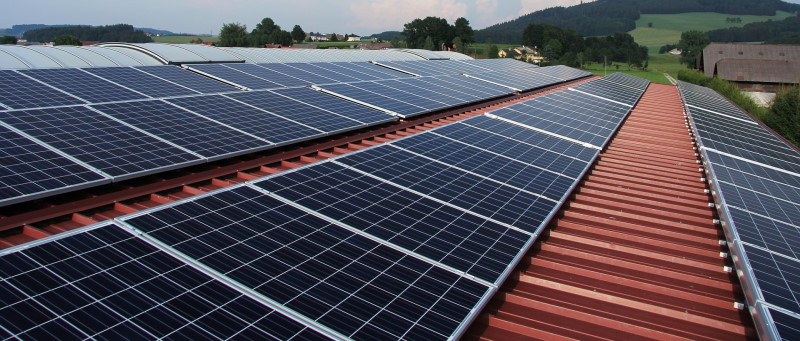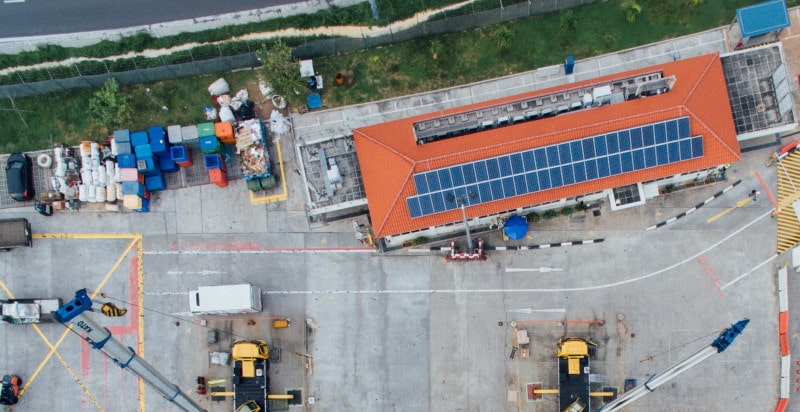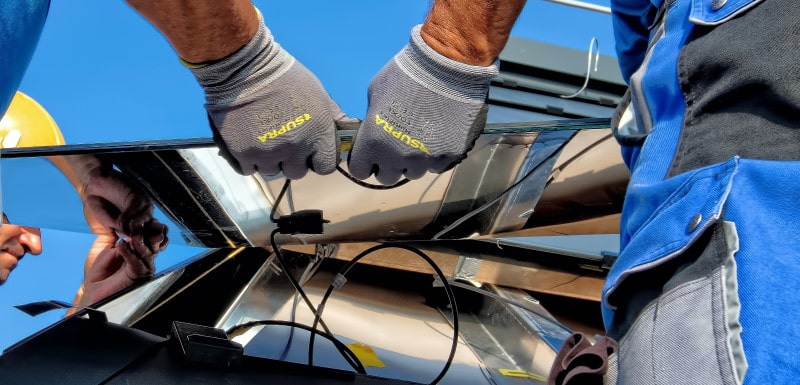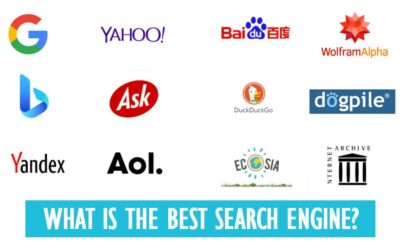From cheaper electricity to desirable green credentials, there are many reasons for a UK business to invest in solar panels.
We explore the key considerations, costs, and how to take the next step towards renewable energy for your business and reducing your carbon footprint.
It is not just UK homeowners and residents who are feeling the squeeze when it comes to rising energy costs. Energy bills are a non-negotiable monthly cost for businesses, many of whom use far more electricity than a typical UK household.
In another guide, we explored how solar panels and solar systems for the home can in the right circumstances, help reduce energy bills for individuals and families.
Can they do the same for UK businesses?
Commercial Solar Panels For Businesses
Firstly, before we explore the opportunities for businesses and how they can benefit from commercial solar panel systems, lets look at how a solar panels works and how they help homeowners save money on their electricity bills.
How do solar panels work?
There are numerous different types of solar panels, but those used for the purpose of generating electricity from sunlight are called Photovoltaic Panels (or PV Panels), hence why they are referred to as “solar PV systems”.
The panels themselves are made up of multiple smaller cells, which are most commonly manufactured from conductive silicon. When sunlight shines onto these cells, electricity is created.
Solar panels for the home – what can we learn?
The average solar panel system used on UK homes is 3.5kWp in size and costs around £4,800 to install.
The Energy Saving Trust estimates that a solar system of this size could save UK homeowners up to £385 per year on their energy bills. This would see the solar panels pay for themselves within 16 years.
Total savings are expected to increase and payback years decrease, with the lifting of the Energy Price Cap in April 2022 – as energy prices would increase by 54%.
Residential Restrictions Not Affecting Business Solar Panels
However, there are several factors in terms of practical, technological and behavioural restrictions – which can limit the savings that solar panels can generate in a residential setting.
Size of the Solar Panel System – The more solar panels that comprise a solar system, the more electricity can be generated. However, most UK homes have only a modest roof space on which to place solar panels, limiting the size of any solar system. This is not the case with commercial offices.
Daylight Hours – Solar panels can only operate in daylight hours and regions in the North of the UK experience less daylight hours than those in the South. This means that homes in the North of the UK, with fewer hours of daylight and only a modest sized home solar system, cannot generate enough of their own electricity to achieve significant savings on their energy bills.
Consumer Habits – Solar panels generate electricity during the day. This means that homeowners will use more solar electricity and save more money on their bills, if they are at home during the day. However, the reality is that many homeowners are not at home during the day, which is why it is estimated that most households will only use about 15-25% of the solar energy generated.
Solar Panels For Businesses – The Opportunities
Despite their limitations in a residential setting, solar panels are still an exciting prospect for businesses for two reasons.
Firstly, the buildings in which businesses operate are much bigger than most homes. Secondly, the electricity usage of a business differs from that of an individual citizen.
Many businesses occupy offices, factories or warehouses with significantly more roof space than a UK home. This means that much larger commercial solar PV systems can be installed, significantly increasing the amount of electricity generated every day.
The increased size of the solar system can even offset the fewer hours of daylight experienced in the North of the UK.

Furthermore, unlike individuals, the majority of businesses use significant amounts of electricity during the daytime – when the solar panels are in operation. The very people who leave their homes during the day do so to go and use computers, operate machinery, or provide a service at their place of work.
Why should businesses install solar panels?
There are financial, commercial and environmental reasons for a UK business to consider installing solar panels.
Solar Panel Financial Benefits
Solar panels have a relatively high upfront cost (detailed below). However they still have the potential to save businesses thousands of pounds on their energy bills every year.
What is more, solar panels have an immediate impact. Businesses will begin generating electricity and therefore start saving money from the very first day the panels are installed.
Businesses whose operations take place during the day will use the majority of the power generated by solar panels. However any surplus electricity can also be sold back to the National Grid.
Commercial Solar Panel Benefits
There is little doubt that the green credentials of a product or business is becoming more and more important to consumers.
Research conducted by Deloitte estimates that 32% of consumers are highly engaged with adopting a more sustainable lifestyle, while 28% of consumers have stopped buying certain products due to ethical or environmental concerns.
Businesses who can use solar panels to generate their own green power can appeal directly to this fast-growing segment of sustainably minded consumers.
Environmental Benefits Of Solar Systems
It is estimated that we need to reduce greenhouse gases by 50% by 2030 in order to stabilise the planet’s temperature and reduce the risk of climate change negatively impacting our societies.
Many businesses will see this aim as a valuable end in itself and will invest in renewable energy such as solar PV systems.
However, every business has an interest in mitigating climate change impacts. Forest fires, powerful storms and soaring temperatures can cause immense damage to local and national communities and their economies.
Commercial Solar Panel Costs
How much are solar panels for business?
Unlike in a residential setting, where the size and scope of solar systems are limited by modest roof sizes, commercial solar panel installations can vary greatly in size.
One business may occupy a small office building, while another may have acres of farmland on which to place solar panels.
As such there is no average solar panel cost for business and commercial settings. However, it’s still possible to estimate the costs of different solar systems.
The entry point for commercial solar panels systems is typically a 10kW system. A 10kW commercial solar PV system will cost a business around £10,000 to install.
The single biggest factor that determines the cost of installing solar panels is the size of the system i.e. the number of panels used.
This means that it’s relatively easy to summarise how costs will increase in line with the size of the system.
| Solar System Output | Typical Commercial Solar Panel Cost |
|---|---|
| 10kW | £10,000 |
| 20kW | £20,000 |
| 40kW | £40,000 |
| 60kW | £50,000 – £70,000 |
The final cost a business can expect to pay to install solar panels will depend on secondary factors such as the type of solar panel used, as well as any specific installation requirements or challenges.
Find Local Commercial Solar Panel Companies
Get free no obligation quotes for solar panel installation today
Solar Panel Financing Options
There’s no doubt that the upfront cost of solar panels is significant. However, another advantage that businesses have over individuals when it comes to solar panel installation is the range of financing options available.
Commercial Solar Finance
Bespoke solar energy finance packages are offered by both solar panel manufacturers and installers, but also third-party financing companies.
The wide range of options available include a Power Purchase Agreement, whereby a business rents their roof space and buys the electricity generated by the solar system at a discounted rate.
Asset Finance
This traditional type of business borrowing would see a finance company pay for solar panels upfront, while the business pays a regular sum to the finance provider.
Business Loans
Generally it does not make financial sense for a homeowner to take out a loan to pay for solar panels (because the expected returns do not outweigh the loan costs)
. However the competitive rates of business loans, combined with the increased money-saving potential of larger commercial solar installations, may make this a viable option for businesses.
Commercial Solar Panel Payback
Solar panels can save a business money both by reducing energy bills and by allowing it to sell surplus electricity back to the national grid. The size of the opportunity will vary from businesses to business.
Here we will use a 10kW solar system as an example:
How much does a 10kW solar system produce in the UK?
A 10kW commercial solar system can be expected to output around 7,000 – 8,000kWh per year.
A 10kW solar panel system can expect to save a business around £2,000 per year*
This means that a business would achieve a return on investment (or payback) on a 10kW solar panel installation within approximately 5 years.
*Figures calculated using Energy Saving Trust data. Includes uplift based on increased daytime commercial electricity use vs residential use.
Smart Export Guarantee
The Smart Export Guarantee (SEG) is a scheme that allows businesses in England, Scotland and Wales to sell any surplus electricity generated by solar panels (or other renewable sources). It replaced the Feed in Tariff, which closed to new applications in April 2019.
Under the scheme, larger energy suppliers are required to offer SEG tariffs. There are no set or minimum tariffs, which means that the energy suppliers get to determine how much they will pay for any electricity they buy.
Businesses that want to sell electricity back to the national grid will need to have a smart meter installed.
What else do you need to know about commercial solar panels?
Do I need planning permission for commercial solar panels?
Roof-mounted solar panels and ground-mounted solar panels up to 9m2 are considered permitted developments. These installations do not require planning permission.
There are some limitations and conditions which should be adhered to when installing a commercial solar system. However a reputable solar panel installer will ensure that the commercial solar installation is done in a way which is compliant.

What types of Solar Panel Systems are there?
Roof Solar Panels – Roof solar panels are mounted on the roof of a building and are the most common systems used in a domestic setting. They are also likely to be ideal for businesses that occupy large offices, warehouses or factories.
Ground-Mounted Solar Panels – For those businesses with an abundance of land, ground mounted solar panels may be the most suitable. These panels are mounted within a bespoke frame and can be easily orientated to face south for maximum efficiency of the solar panels. Systems larger than 9m2 will require planning permission.
Floating Solar Panels – Few business premises incorporate a large body of water. However, those that do may be able to benefit from floating solar systems, which have a similar set-up to ground-mounted systems. Like those ground-mounted systems, floating solar panels require planning permission.
Can I get free solar panels? Or a UK government grant for solar panels?
There are currently no UK solar panel grants available to help fund or partially fund the installation costs of solar panels (this is true both for home solar panels and commercial solar panels).
Should businesses consider commercial battery storage for solar energy?
Solar panels produce electricity during the day, but they do not store the electricity that is generated. The electricity needs to be either used or sold to the grid.
A commercial solar battery can enhance the capability of a solar power system by allowing a business to store the energy produced during the day for use in the evening.
This is advantageous for 24hr businesses, for example factories, who continue to use electricity into the early evening when electricity prices are at their highest.
However, like solar panels, solar batteries are not inexpensive. Depending on the amount of storage desired, a commercial solar battery could easily cost in excess of £10,000.
It’s important for business owners to remember that one of the central advantages of commercial solar panels is that, unlike homeowners, businesses tend to use electricity during the day.
If your business does not typically use electricity during the day, increasing your upfront costs to incorporate a solar battery may severely limit the likelihood of a financial return.
How do businesses get solar panels?
A commercial solar panel system is a significant business investment, but thankfully there are many commercial solar panel installation specialists in the UK to help you get the best solar PV system for your business.

Here are the key considerations to take into account when choosing a supplier:
1. Advice & Guidance – Every UK business is different, and every business will have differing power needs, usage habits and available space for a solar panel system.
It’s unlikely that an “off-the-shelf” solar system represents the best investment. Look for a highly rated supplier who will help you understand the options available and recommend a solution tailored to your business.
2. Finance Options – Investing in a solar PV system doesn’t necessarily mean paying a significant upfront installation costs.
If you are interested in spreading the cost of commercial solar panels, be sure to compare the finance and leasing options offered by different suppliers.
3. Certified Installers and Certified Solar Panel Systems – In order to sell electricity produced by solar panels under the Smart Export Guarantee, both the solar panels themselves and the company installing commercial solar panels need to be certified under Microgeneration Certification Scheme (MCS) or equivalent.
Your energy provider may ask to see a certificate before agreeing to place you on a SEG tariff.
4. Get Multiple Quotes – Make sure that you’re getting the best price for your solar panels by obtaining quotes from multiple businesses.
You can use our free service below to get competitive quotes in minutes.
Are commercial solar panels worth it?
It depends on your business!
There’s no doubt that commercial solar panels represent an attractive opportunity for some businesses, who can reduce their monthly energy bills and reduce their carbon emissions and carbon footprint at the same time.
However the opportunity is not equal across all businesses.
Small businesses with little space for solar PV panels may struggle to generate enough of their own electricity to see a return on their investment.
Businesses who use the most electricity at night may also struggle to use enough solar-generated electricity to make the investment worthwhile. The biggest opportunities are for larger businesses who use electricity during the day.
Calculating the value of commercial solar panels for your business is not always straightforward. That is why we recommend contacting a highly rated solar panel supplier to help you determine the best solution for your business.
Use our free service below to contact highly rated solar panel companies and to get free quotes in a matter of minutes.
Request Free Solar Panel Prices
Get free no obligation estimates for solar panel installation



